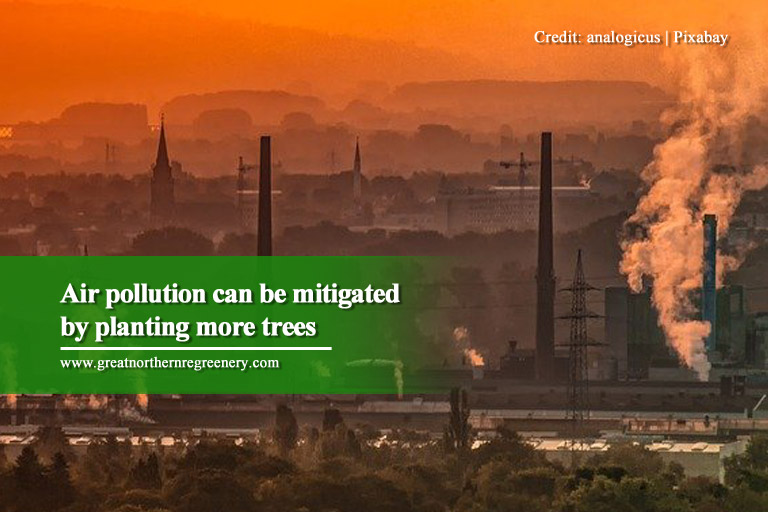Trees bring us a lot of benefits and the way they affect our health and wellness are some of the most prominent. Every day, we breathe in oxygen and breathe out carbon dioxide, while trees absorb carbon dioxide and emit oxygen. A single large tree can supply enough oxygen for 4 humans, but it takes about 5 trees to absorb the CO2 produced by a single person. In addition to providing fresh, clean air for breathing, trees can significantly improve our health in other ways, too.
How Trees Benefit the Environment

To answer the overarching question, “Why are trees important?”, let’s start by learning about the many benefits of trees for the environment:
- Trees fight air pollution
Air pollution is a major environmental problem and it also causes people to get sick. Large-leaved trees offer more surface area for leaves to filter the pollutants from the air. Moreover, certain tree species, such as elms, have a filtering advantage because they have hairy leaves that work better at trapping the dirty particles. If they’re stuck to the leaves, then it prevents us from inhaling them.
- Trees help cool down neighbourhoods
The trees in US cities help keep temperatures down according to Rob McDonald, a lead scientist at the Nature Conservancy. He further states that the average reduction is 2°F to 4°F during the summer months. This can mean the difference, specifically for the elderly, between staying healthy or risking heatstroke. Trees form a canopy that shades pavements and sidewalks thus preventing them from getting too hot.
How Trees Benefit Physical Health
The presence of trees also have a noticeable impact on human health:

- Trees help prevent asthma
Just a few years ago, strategically placed sensors measured the nitrogen dioxide levels in various Oregon neighbourhoods. Produced by industrial processes, automotive emissions, and other sources, nitrogen peroxide is a huge part of smog and one of the 6 leading air pollutants identified by the Environmental Protection Agency (EPA).
In a study done by Portland State University, tree cover had a remarkable effect on nitrogen dioxide levels and people’s respiratory health in the area. For example, in higher tree areas, young children were estimated to have avoided missing more than 7,000 school days annually due to asthma attacks. Furthermore, emergency room visits due to asthma were reduced by an estimated 54 visits among all residents annually. This just proves the importance of trees in our lives.
- Trees help boost our immune system
Recent studies show that spending short amounts of time in forests seems to improve our immune system. One study done in China found that senior patients with chronic obstructive pulmonary disease had improved immune function after forest bathing. Although it’s not entirely clear why this would be, a prior study implies that trees may enhance immunity thanks to the certain aromatic compounds they produce.
- Trees help improve heart health
In a 2019 study in Japan, participants walked in an urban environment one day and in a forest another day, with researchers measuring how the walk affected their bodies. Compared to the urban environment, forest bathing lowered participants’ cortisol levels, blood pressure, pulse rates, and sympathetic nervous system activity (related to stress), while increasing their parasympathetic nervous system activity (related to relaxation). All of these factors are tied to improved heart health, suggesting that taking a walk in a forest enhances cardiovascular function.

- Trees improve the quality of sleep
In a study, published in Preventive Medicine’s September 2015 issue, involving over 255,000 adults, the researchers investigated the effect of the natural environment on sleep. Ambient temperature, humidity, heat, light exposure, and proximity to bodies of water or the oceanfront were all factored into this research. They concluded that green space in itself helped protect older adults and men of all ages from lack of sleep.
- Trees and greenery may increase human lifespan
Harvard-affiliated researchers followed 110,000 women over 8 years in a study published in Environmental Health Perspectives. The researchers found that women residing in the greenest areas had a 12% lower non-accidental death rate than those living around the least vegetation. While there was no clear delineation between cause and effect, reduced death rates from cancer and respiratory illness were strongly associated with the presence of greenery. So, what do trees give us? This particular study suggests trees promote a longer lifespan.
Trees can also trap air pollutants, eliminating them from the atmosphere and keeping our respiratory systems healthy. Since the other pollutants are intercepted, trees are also providing us with cleaner water. You might think that trees are only good for our physical health. However, many studies have shown that trees also contribute to our mental and emotional wellbeing.
How Trees Benefit Psychological Health
Here are some of the more provocative data from recent studies on how trees affect our mental and emotional wellbeing.

- Trees make us feel less stressed and more rejuvenated
One of the most well-scrutinized benefits of nature exposure is that it seems to help minimize stress, anxiety, and overthinking. Most of these studies were conducted in forests.
According to a study conducted in Japan, 585 young adult participants reported on their moods after walking in a forest or urban setting for 15 minutes. These urban areas and forests were in 52 different locations around Japan, and about a dozen participants walked in each location. In all cases, those who walked in a forest experienced less fatigue, hostility, confusion, anxiety, and depressive symptoms while reporting increased energy levels, compared to those who walked in an urban area. The results were even more apparent in participants who were the most anxious, to begin with.
- Trees ease stress and depression
Lush natural surroundings tend to encourage physical activity and social connection and hinders depression. Also, nature reduces stress which leads to improved physical wellbeing. Various other research suggests that “forest bathing” — spending time in the woods — can help people deal with the stresses of modern living.
- Trees may make people more trusting and generous

New findings suggest that experiencing nature helps us to be more compassionate with others, and many of those research involve trees.
In one study, researchers asked a group of college students to look up at either a grove of towering trees or a tall building for 1 minute. They concluded that students who studied the trees experienced a sense of wonder and of being in presence of something larger than themselves. Afterward, when a researcher pretended to accidentally drop some pens, the participants who had seen the trees helped pick up more pens compared to those who had looked at a building.
In another study, researchers found that people were more inclined to help someone who’d lost a glove after they’ve spent time walking through a park full of trees, rather than if they were near the park’s entrance.
However, note that most of these studies don’t specify the benefits gleaned from green space versus trees in general. Although it’s difficult to know exactly what role that trees play in promoting pleasant mood and behaviour, there’s a good chance that their presence contributes to better social interactions at the very least.
So, the next time you’re asked the question “what do we get from trees?”, you can tell them the things you learned here.
Trees give us more than just oxygen and we must take good care of them. If you’re looking for a dependable tree service company, then Great Northern ReGreenery is the perfect choice. We offer an extensive list of services 一 from aeration, transfers, planting, fertilization to tree stumping and more. Give us a call now: toll-free 1-877-775-7444 or (905) 775-7444.





